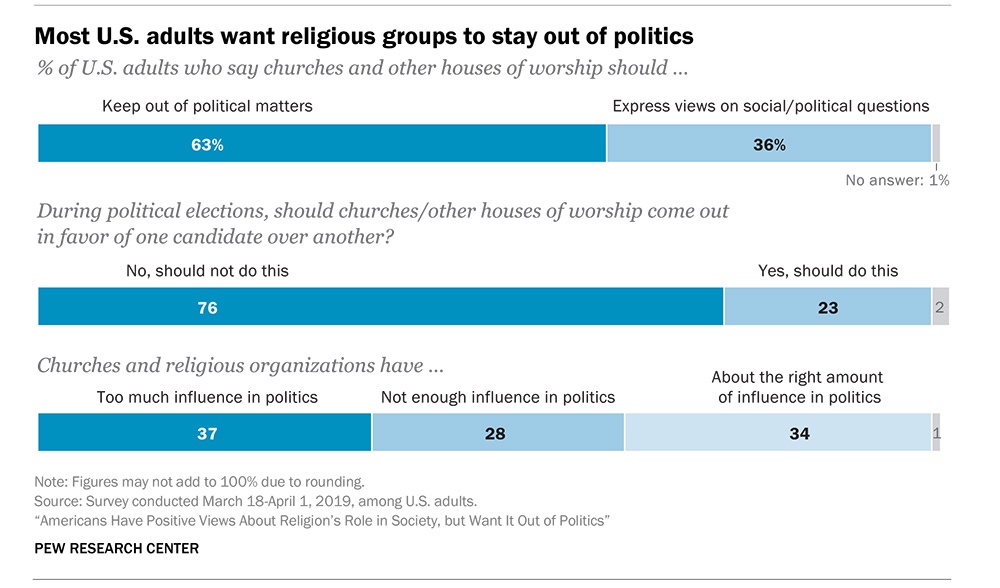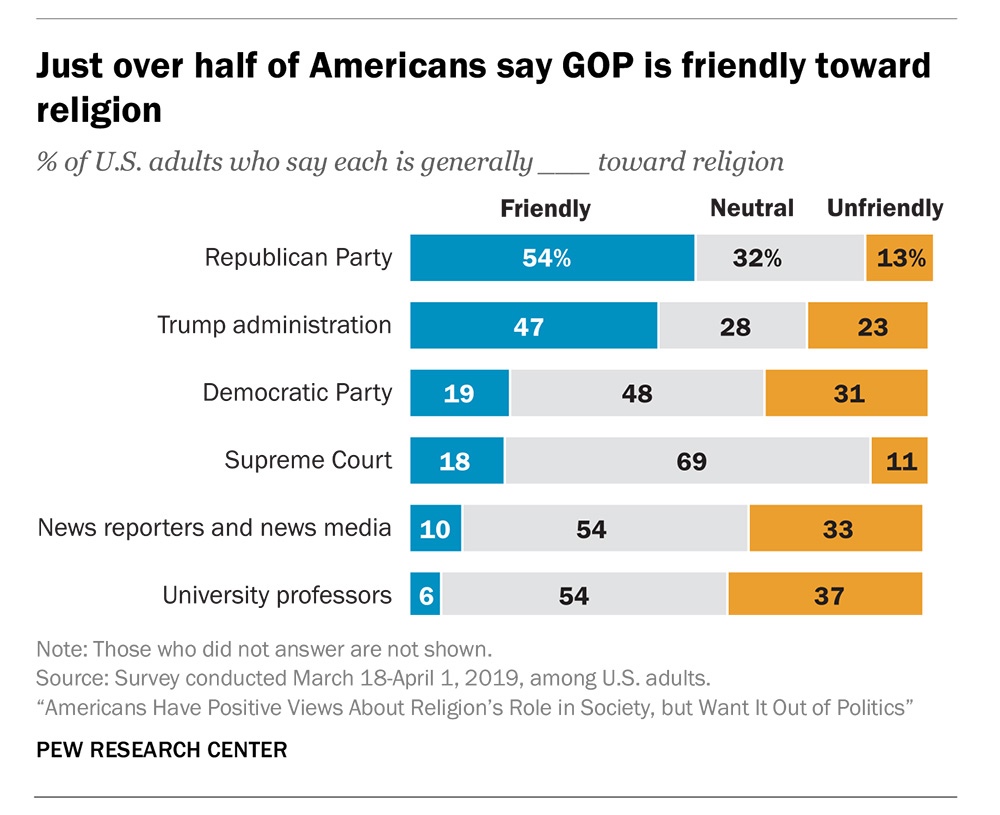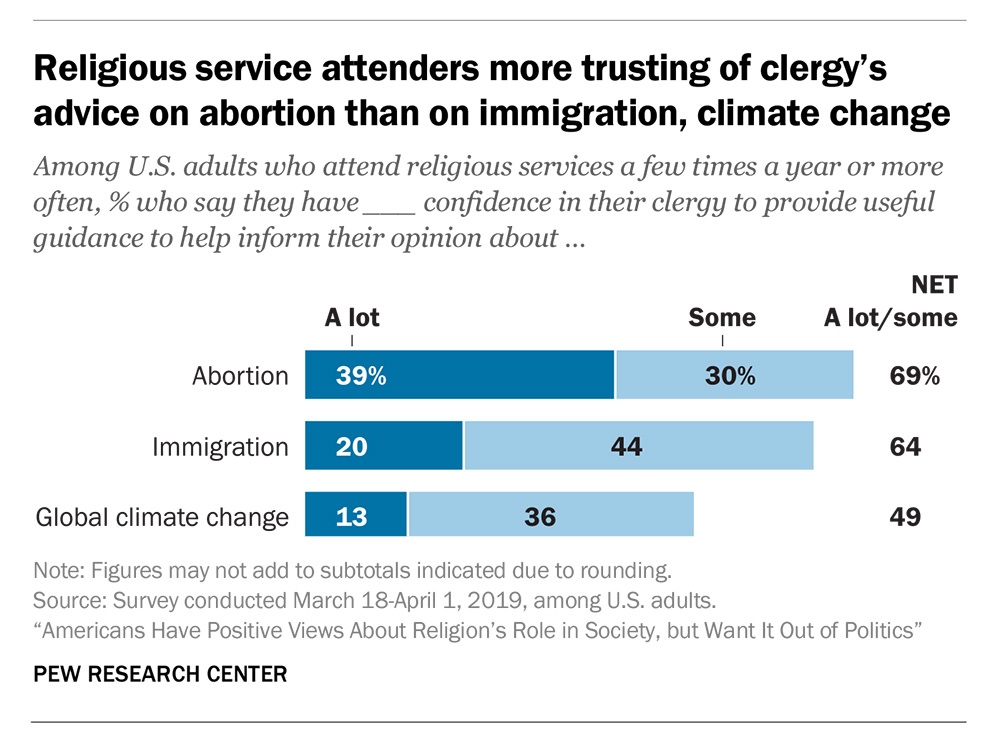As Americans gear up for a long and bitterly contentious presidential election year, their message to religious leaders and institutions couldn’t be clearer: Keep out.
That’s the finding in the latest Pew Research poll, which found that 63 per cent of Americans say churches and other houses of worship should stay out of politics, and 76 per cent said religious congregations should not make political endorsements.

The poll, which Pew conducted online this past March from among 6,364 US adults, also found that slightly more than half of US adults say that the Republican Party is friendly toward religion (54 per cent). Only one in five, (19 per cent), think the Democratic Party is friendly toward religion. (According to Pew, Republican respondents said the Democratic Party is unfriendly toward religion, while most Democrats view their own party as neutral toward religion.)
“It used to be Republicans were viewed as friendly toward religion and Democrats were viewed as neutral,” said David Campbell, professor of American Democracy at the University of Notre Dame. “Now you see a growing number of people saying, no, the Democrats are unfriendly toward religion.”
But the view that religion should not have as big a role in politics cut across religious faiths. Jews and the religiously unaffiliated are more likely than Christians to oppose mixing religion and politics. Even among Christians, however, 70 per cent say churches and other houses of worship should not endorse candidates for political office, and more than half (54 per cent) say churches should keep out of political matters.

Those views extend to the pulpit, too. While most people who attend religious services are satisfied with the amount of political discussion they’re hearing in sermons, they tend to trust clergy less on political hot-button issues.
Only 40 per cent of people who attend religious services at least a few times a year have “a lot” of confidence in their clergy to provide useful guidance on abortion. They feel far less confident in clergy guidance on issues of immigration and climate change. Only 20 per cent trusted their clergy’s guidance “a lot” on immigration issues and only 13 per cent trusted their clergy’s advice “a lot” on climate change.
Catholics, in particular, are consistently less likely than Protestants to say they trust their clergy on all three issues.
“On abortion, for example, 34 per cent of Catholics say they have a lot of trust in their clergy to provide guidance that helps form their opinion, compared with 46 per cent of Protestants overall and 57% of evangelical Protestants who say this,” the report concluded.
“Mainline Protestants (33 per cent) and members of the historically black Protestant tradition (32 per cent) look similar to Catholics on this question,” the report added.
At the same time, more than half of the public believes that religious congregations do more good than harm in American society; only 20 per cent of Americans say religious organizations do more harm than good.

The poll also showed stark racial differences among Democrats in views on religion’s role in society: 57 per cent of black Democrats say churches and religious organisations do more good than harm in American society. White Democrats were not so sure, with only about 39 per cent agreeing that religious organisations do more good than harm.
African American Democrats also stood out for having the most negative views of the Trump administration toward religion, with 61 per cent saying the administration was “unfriendly” toward religion – more than any other religious group.
“Their understanding of religion and politics is very different from what white Americans see it as,” said Tobin Grant, professor of political science at Southern Illinois University.
Claire Gecewicz, the lead researcher on the poll, said that while Pew has asked similar questions in the past, the methodologies were different. Past surveys were conducted by telephone; this survey was conducted online, and therefore there are no comparisons to be drawn with past data.
Campbell, who studies religion’s role in US civic life, said the finding that 76 per cent of Americans are uncomfortable with political endorsements is significant.
“I and others have found evidence that many Americans are actually leaving religion because of religious leaders who take political positions,” he said. “When we see that reflected in a poll like this, it’s yet another indication of the risk religious leaders take for their own congregations when they get involved with politics. They risk alienating people who would otherwise be in the pews.”





